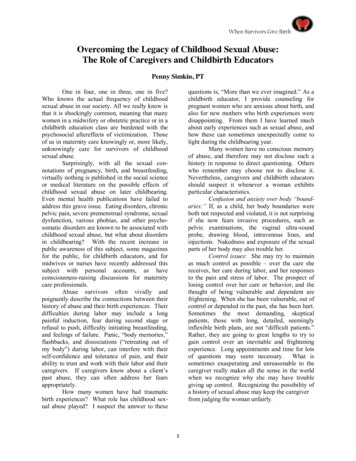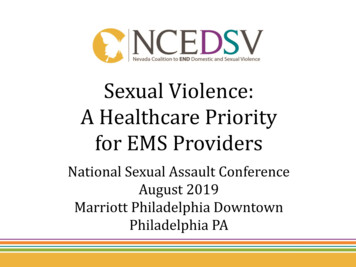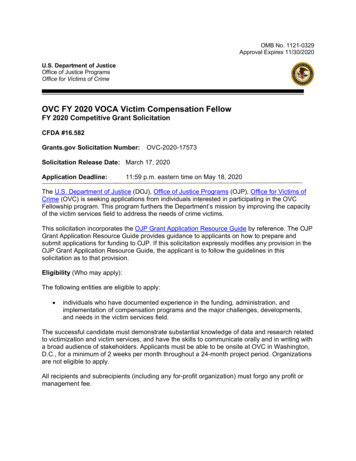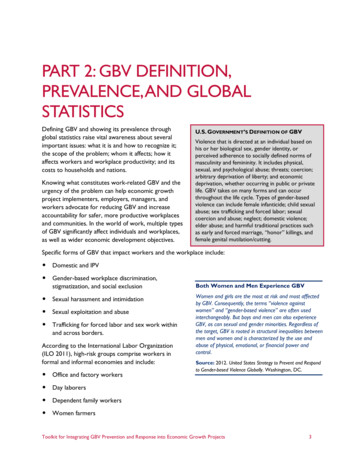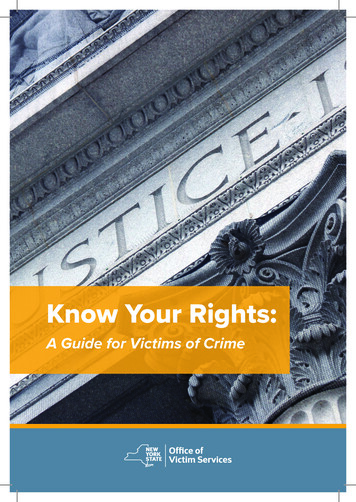
Transcription
Know Your Rights:A Guide for Victims of Crime1
The Office of Victim Services (OVS) helps crimevictims. You can reach OVS by telephone, emailor online:Telephone: 1-800-247-8035Hours: 9 a.m. to 5 p.m., Monday – FridayEmail: ovsinfo@ovs.ny.govOnline: ovs.ny.govOVS also has two offices:55 Hanson Place, 10th Floor80 South Swan St., Second FloorBrooklyn, NY 11217Albany, NY 12210(718) 923-4325(518) 457-8727If you wish to visit an OVS location, you must call to make an appointment.You can also visit ovs.ny.gov/help for more information and to searchfor programs and resources near you.The District Attorney’s (DA’s) Office also may refer you to a victimassistance program. If you have questions about a criminal case, visitwww.nypti.org/new-york-district-attorneys to find the DA’s Office in yourcounty. Once you have a contact in the DA’s Office, write it here for futurereference.Name:Email:Phone Number:Address:Civil Legal AssistanceIndividuals who have been victims of a crime may need legal help withfamily matters, housing, employment, finances and other issues.Visit crimevictimshelpny.org for information and resources.1
How can victims of crime get financial help?OVS may pay costs you had because of the crime, including: the repair orreplacement of essential personal property; loss of earnings or support;medical bills, including the cost of counseling; vocational rehabilitation;crime scene clean-up; or funeral bills.To get help, you must file a claim with OVS. You can get a claim formfrom a police department or sheriff’s office, a victim advocate, hospitalemergency room, or online (ovs.ny.gov). Claims must be filed within oneyear. If a victim has died, the claim must be filed within one year of thedate of death.Victim advocates can help you with filing a claim. You can also get helpfrom rape crisis centers, domestic violence programs or shelters, andvictim assistance programs.Any payments from the following sources may reduce benefits providedby OVS: insurance, veteran’s or Social Security benefits; worker’s compensation benefits if the crime happened at workincluding payment for: medical care and physical therapy, lostwages, disability benefits, or death benefits; or filing a civil lawsuit.If you are the victim of a crime:You have the right to know what is happening in yourcriminal case.You have the right to know how the case is being handled. To stayinformed you must give your phone number and address to the DistrictAttorney’s Office and update this information when it changes. Youshould be told: the date someone is arrested; the date that person sees a judge for the first time; when that person is out of jail;2
3
when someone pleads guilty to the crime;the date of trial;the date of sentencing; andthe possible sentence.You have the right to attend court.The prosecutor (another name for DA, the lawyer handling the caseagainst someone who has been arrested) may ask you to stay away fromcourt because of how they plan to handle your case. But, even if you areasked to stay away, you have the right to be in court.You have rights while defendants are facing trial.You may ask the police or prosecutor to contact your employer if you mustmiss work to help with the case. The police or prosecutor also should helpby giving creditors information about the crime if you can’t pay your billsbecause of the crime.Property held as evidence must be given back to you unless it is neededfor proof at trial. The court will help to return property promptly.You have the right to be free from intimidation.Crime victims have the right to be protected from threats, physical injuryor other forms of intimidation. The police department, sheriff’s office orDA/prosecutor can give advice about how to protect yourself. Courts canissue orders of protection that direct the accused to stay away from you.Intimidating a witness is a felony. Felonies are crimes for which a personcan be sentenced to more than one year in prison. If you are threatenedor harassed, immediately contact the police, sheriff’s office, or DA/prosecutor.4
If you receive unwanted contact after the individual is in prison,contact the Office of Victim Assistance at the New York StateDepartment of Corrections and Community Supervision(1-800-783-6059) right away.Witnesses and victims may get help in relocating and changing theiridentities if needed.If possible, when waiting to go into court, prosecution witnesses shall beprovided a secure waiting area separate from all other witnesses.You have the right to let law enforcement, the courts andthe Parole Board know how you think and feel about thecrime and how it affected you.This is called making a victim impact statement. This statement allowsyou to share your feelings about the crime, how it affected you and yourfamily, and what you think the defendant owes you. You may make thesestatements when the defendant is sentenced or eligible for parole.The DA/prosecutor will ask what you think about releasing the defendantand about sentences other than prison. The court shall consider yourviews at sentencing.At least 10 days in advance, you may ask to speak when the defendantis sentenced. You must let the court know you want to do this. You mayspeak about anything that relates to the possible sentence. If the victim ofthe crime is a minor, has died or been hurt and can’t be in court, a relativemay speak for the victim. You may make your statement in person atsentencing, or in writing as part of a pre-sentence report.When a defendant is eligible for parole, you can also make a statementto the Parole Board. You may meet face-to-face with a member of theParole Board, make your statement in writing, or make an audio or videorecording of your statement. The defendant would not be at any face-toface meeting.5
6
You have the right to ask the DA to let you know how thecase ended.When making this request, ask for the “final disposition” of the case: wasthe person found guilty or not. You will get an answer within 60 days ofwhen the case ended.The Office of Victim Assistance at the state Department of Correctionsand Community Supervision can answer questions about individualssentenced to state prison. You may get information on theseindividuals by:Calling VINE (Victim Information and Notification Everyday) at1-888-846-3469 or 1-888-VINE4NY and providing the: inmate’s full name, date of birth, and NYS ID number or the ID number assigned by the Department ofCorrections and Community Supervision.Note: The DA’s office will provide the NYS ID number and/or the inmate’sdate of birth. Visit www.doccs.ny.gov to locate an inmate. Click “Find anOffender” then “Inmate Look-Up”.You have the right to know when an inmate is released.You can register to be told when an inmate will go before the ParoleBoard and before an inmate is released. If you want to be told when aninmate is scheduled to go before the Parole Board or scheduled to bereleased, you must: Ask the DA’s Office for the form to make this request, complete theform and then return it to the DA’s Office. Submit the form online at https://doccs.ny.gov/victim-notifications.You must register using this form to be notified of the chance to make aParole Victim Impact statement. Registering with VINE alone will not notifyyou about this.7
For additional questions about victim notification or making a ParoleVictim Impact Statement, contact the Department of Correctionsand Community Supervision Office of Victim Assistance atdoccsvictimassistance@doccs.ny.gov or 1-800-783-6059.You also can sign up for telephone, text or email notifications from VINEto learn when an inmate is released and other information, such as aninmate’s death, furlough, escape, and return to custody after an escape.Call 1-888-846-3469, 1-888-VINE4NY or visit www.vinelink.com to betold when a person is released from custody.Other things you should know about your rights: You may always have a free copy of the police report. You can ask the Department of Motor Vehicles to waive fees forreplacing licenses, permits, registrations and license plates lost,destroyed or stolen because of a crime. Employers cannot fire or punish you because you:were a witness in court; took time to give a statement to the Parole Board, or helped the DA. These rights apply to:the next of kin of victims who died,representatives of victims, and Good Samaritans, who are people who tried to help victims eventhough it was not their job, i.e., they are not police, firefighters, etc. Violating this law is a misdemeanor. Your employer may decide, however,not to pay you for the time you spent away from work while involved inany of these activities.18
Victims can ask that a person convicted of a felony sexual offensebe ordered to be tested for HIV. Requests must be in writing andmust be filed with the court. A representative can act for a minorvictim or someone a court has determined cannot handle his orher personal affairs. The test results are given to the victim and thedefendant; they are not disclosed to the court. The court may order the identifying information of a personapplying for a name change sealed if publishing this informationmight put the person at risk.Restitution: Your right to be paid backAs a victim, you can ask that the defendant pay you back for what youlost due to the crime: This is known as restitution. It is not paid for futurelosses or pain and suffering.Restitution must be part of a defendant’s sentence. The amount paid toyou will be based on proof of what you lost because of the crime. Keep records and receipts of any costs you have due to the crime,and Give copies of those records and receipts to the police, DA andProbation Department. Your claim for restitution will be part of thereport that the Probation Department files with the court.If you do not provide this information in time to be part of the defendant’ssentence, you may be able to get repaid by suing the defendant.You can ask for, but are not limited, to restitution for: medical and counseling costs,loss of earnings,replacing, repair or cleaning of property,funeral costs, andany other cost you incurred because of the crime.The defendant can object and the court may hold a hearing on yourrequest. The DA may ask you to testify at that hearing. If you are worriedabout being in court, you should talk to the DA.9
A judge will usually order the defendant to pay you back. If the judgedoes not order repayment, he or she must clearly state why, on therecord. The restitution order will be on the individual’s commitment paper,which is the written instruction from the court directing the convictedperson to be put in jail or prison.The agency responsible for collecting repayment is listed on therestitution order. Payments are required to be made as ordered and willbe made by check. You must provide a current address and update youraddress information if it changes.Restitution from minors or persons in need of supervision (PINS) mustbe ordered by the Family Court. Repayment from juvenile delinquents islimited to 1,500, and 1,000 from PINS. To seek additional restitution,victims may file a lawsuit against the minor’s parents or guardians.If OVS has paid your bills and the court orders restitution, that repaymentmay be made to OVS, not you. If you filed a claim with OVS, it is importantthat you tell OVS if the court orders repayment.Certain victims of crime have additional rightsunder the law.Rights of Child Victims:1. Describing the crime as few times as possible;2. Having a judge sensitive to the stress a child may experiencetestifying;3. Having the same prosecutor handle the case whenever possible;4. Using a video-recording or two-way closed-circuit TV when actingas a witness;5. Having a support person when acting as a witness in court;6. Using dolls and drawings when acting as a witness;7. Having a team of people from various fields to address child abuse.110
11
Rights of Victims of Domestic Violence:1. An order of protection, which is an order of a court that requires oneperson to stay away from another person. Orders of protection areserved at no cost. Criminal courts can give such orders to anyonewhile Family Court is limited to giving such orders to: relatives, former spouses, or people who are not related but have an “intimate relationship.”The judge will decide if a relationship is “intimate;” non-sexualrelationships can be “intimate.”2. An arrest made by police if: Police find that your abuser committed a felony against you, theymust make an arrest. An order of protection has been violated. This is true even if theorder of protection was issued in another county, state, territory ortribal jurisdiction. Police determine that a misdemeanor has been committed againstyou, unless you ask them not to. Even if you make that request,police may still make the arrest. Misdemeanors are crimes for whicha person can be sentenced for up to one year in jail.3. When police believe that more than one family or household membercommitted a misdemeanor family offense, they are not requiredto arrest more than one person. In such cases, police must try todetermine who is most responsible and arrest that individual.4. If the police do not witness the violation or do not make an arrest, youcan make a civilian arrest. This does not mean that you must physically make the arrest. Itmeans that you must sign a complaint. Police may either take your abuser into custody or give youinformation on how to get the court to take some action.12
5. In addition to making arrests, police can help you: get to a safe place: victims of domestic violence can get emergencyresidential services; get information on how the court can help protect you; get medical care; get personal belongings from your home; get a free copy of any incident reports; and file a complaint in criminal court.6. You may either place or temporarily lift a “freeze” on your creditreport free of charge. To do this you must a) write to the creditreporting agency, and b) give proof you are a victim of domesticviolence by providing one of the following: a domestic incident report (called a DIR),a police report,an order of protection, oran affidavit of a medical provider or of a victim advocateCredit reporting agencies must not share the reason for the request.7. To be treated fairly by an employer or licensing agency in hiring oremployment practices.8. To avoid forced contact with your abuser.9. To request a new telephone number, at no cost.Rights of Victims of Rape or Sexual Assault:1. To be informed in writing of the name, address and phone number ofthe nearest rape crisis center;2. To a private setting when being interviewed;3. To limit people in the interview to: those conducting the interview, a social worker, rape crisis counselor, psychologist or otherprofessional providing emotional support, and the victim’s parents,friend or a spouse, if requested by the victim.13
14
4. To not be asked or required to take a lie detector test or stress exam.5. To have OVS pay for a medical exam related to a sexual assault. Inaddition: Examiners and facilities must accept the state’s reimbursement aspayment in full. Victims may assign insurance benefits to the examination provider. If victims assign insurance benefits, such coverage may not besubject to annual deductibles or co-pays or balance billing bythe provider. Note: For insurance policies and contracts issued,renewed, modified, altered or amended on or after Jan. 1, 2019. Victims may choose, however, not to provide insurance informationto the examination provider if concerned about privacy or safety.6. To have clothes returned upon request.7. Hospitals providing emergency treatment: shall provide information on the availability of emergencycontraception, its use and how well it works; must provide emergency contraception, unless the victim refuses orif the victim is pregnant; and must offer victims a trained sexual assault advocate during theexamination.8. To have sexual offense evidence collected and kept in a locked,separate and secure area for 20 years from the date of collectionif the assault is not reported to the police. Victims will be notifiedat least three months before the end of the 20-year period that theevidence will be discarded.New York StateDomestic and Sexual Violence Hotline:1-800-942-6906English & españolMulti-language AccessibilityDeaf or Hard of Hearing: 711Chat/Text: opdv.ny.govThe hotline, text and chat are confidential and available 24/7.115
New York State Sexual Assault VictimBill of Rights:The New York State Sexual Assault Victim Bill of Rights is a list of generalinformation about your rights.General Rights You cannot be treated differently based on certain characteristics,such as race, national origin, religion, sexual orientation, disability,age, source of payment, sex, gender identity, or gender expression. Your immigration status or national origin cannot affect youremergency care or services. You can ask for an interpreter if it ishard for you to understand or speak English. Minors under the age of 17 have certain rights to make their owndecisions without a parent or legal guardian.Hospital Emergency Department Rights You can have an advocate from the local rape crisis program staywith you during the exam. You can have an exam in any hospital emergency department tocollect evidence and provide certain medical care related to thesexual assault at no cost to you. If you do not have health insurance,or you decline to use your health insurance, you can ask thehospital to bill the Office of Victim Services. You can have medicine to prevent pregnancy and sexuallytransmitted infections (STIs, also known as STDs) for free. For HIVprevention, a 7-day pack of medicine can be started at the hospital. You will be provided information on appropriate follow-up medicalcare.16
Law Enforcement Rights You can choose to report to the police or not. You can choose to have or not have an advocate from the localrape crisis program stay with you during your interview with thepolice or prosecutor. You will be given contact information for the police or prosecutorhandling your case. You can contact the police or prosecutor for information on thecriminal investigation or legal proceedings. The police or prosecutorwill inform you of any legal action related to your case. If you choose to report to the police, your evidence will be testedwithin 100 days. You may contact the police for information on aDNA match. If you choose not to report to the police, your evidence will bestored for 20 years, or until you decide to release it. You willbe notified if your evidence is moved and before the storageperiod ends.17
Notes:18
Notes:19
Notes:20
Notes:21
(1-800-783-6059) right away. Witnesses and victims may get help in relocating and changing their identities if needed. If possible, when waiting to go into court, prosecution witnesses shall be provided a secure waiting area separate from all other witnesses. You have the right to let law enforcement, the courts and

